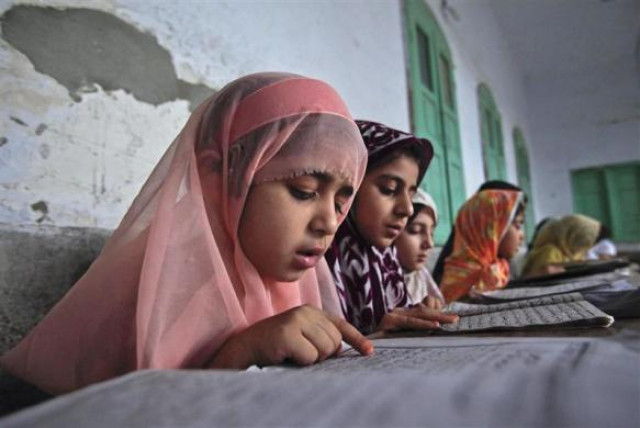Eager to learn, women of Rasool Bux Chanjan land on their feet
The National Rural Support Programme aims to combat child labour through its centres.

According to Asia, many girls in her village want to attend school but their parents do not allow them to travel as far as Mando Dero. PHOTO: REUTERS/ FILE
Asia lives in Rasool Bux Chanjan, a village situated near Mando Dero. Though the village isn’t too far from Sukkur - only around 15 kilometres away - it lacks basic civic facilities, such as sanitation, water supply, drainage and health. Availability of educational facilities is also a challenge, to the extent that for primary education, even boys have to walk more than three kilometres to Mando Dero.

“My dream was always to attend a school and receive education for a better future. Unfortunately, there is no school in our village,” Asia told The Express Tribune. “Some of the boys from the village now go to Mando Dero where a middle school was established recently. Earlier, they had to go to Ali Wahan, which is at a distance of seven kilometres from our village.”
According to Asia, many girls in her village want to attend school but their parents do not allow them to travel as far as Mando Dero. “In a way, my dream came true when the National Rural Support Programme (NRSP) started the Adult Literacy Center in our village. After completing a six-month course of the adult literacy programme, I am able to read and write in Sindhi, and also do some math.”
Acquiring skills
Along with other girls of her age, Asia underwent a vocational training for two months and now she can cut and stitch different types of dresses on her own. “Today [Monday] I am very happy that I have received a sewing machine and a certificate which enables me to get rid of making baskets and mats and earn a respectable livelihood for myself and my family,” said Asia, adding that since education was equally beneficial for both men and women, she hoped that families in the rural areas would send their daughters to schools. “I would like to pass on the knowledge I have received in the last eight months to other girls of my village.”
Supporting families
Another participant of the course, Sultana, is the eldest of her four siblings. “Making baskets and mats from date leaves is not an easy job because before we start weaving, the leaves have to be soaked in a chemical to give them a soft texture,” she said. Sultana gets Rs60 for a mat, which takes three to four days to complete, and Rs25 for a basket. “Now, with the help of NRSP, I am able to earn good living,” she said.
The same sentiments were expressed by Haseena who has ten siblings. “My brothers go to the school in Ali Wahan and also work at roadside hotels. Now I will start stitching clothes and lend a helping hand to my brothers and father,” she said.
Non-formal education
Project manager, Mohammad Abdullah Avais, said that the NRSP is funded by the European Union while the International Labour Organisation provides technical assistance. “We run non-formal education centres and adult literacy centres in collaboration with the Institute of Rural Management. Our main purpose is to save children from abusive child labour,” he said. “So far, thousands of children between the ages of five to 12, who were earlier involved in child labour, have been educated at our centres and been inducted into different educational institutes.”
He told The Express Tribune that thousands of girls and boys, aged 15 to 17 years, have also been educated at their adult literacy centres and were making a living after undergoing two months vocational training under different cadres. At the ceremony held on Monday, he distributed sewing machines along with accessories and certificates among 40 female participants of the course.
Published in The Express Tribune, September 20th, 2013.



















COMMENTS
Comments are moderated and generally will be posted if they are on-topic and not abusive.
For more information, please see our Comments FAQ